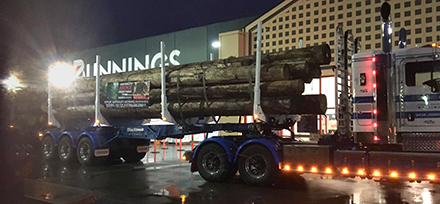The protests this week against Bunnings’ decision to refuse to stock Victorian timber sourced from VicForests was well organised and well supported. The Construction Forestry Maritime Mining and Energy Union’s blockade at Traralgon was inspired. Source: Bruce Mitchell
Anyone who has ever attempted to get a large organisation to change its mind knows the best way is by attacking that organisation’s income stream.
One protest at Traralgon won’t do that, but the union’s promise that the blockade was a sign of things to come at Bunnings Warehouses across Australia should have the company a little concerned.
Having the union backing the cause is a huge bonus for the timber industry.
The CFMMEU is organised, it can rally its members quickly, and can act decisively, it is accustomed to a fight, and it has the muscle.
In this matter, it could easily become a thorn in Bunnings’ side.
To achieve that the union needs to take the message far beyond Traralgon, and it has already said it will do that.
Because where the message is probably not being heard is outside Gippsland. It did get coverage on Sky News, but not much else in metropolitan Melbourne.
The union will know this, and will no doubt plan its targets carefully.
Any support the wider community can give the campaign will be gratefully received.
Probably the best message, pointed out by so many, is the perceived hypocrisy by Bunning.
One hand the company says it has a “zero-tolerance approach” to illegally logged timber and justified its decision on a recent Federal Court ruling which had found VicForests guilty of breaching Victoria’s Code of Practice for Timber Production.
It’s “zero-tolerance approach” is to be applauded. But that argument fails because the company is happy to stock timber from South East Asian rainforests which are listed by the International Union for the Conservation of Nature as critically endangered, endangered or vulnerable.
Native timber harvesting in Australia, on the other hand, is sustainable and ethically managed.
Surely Bunnings could mount a better argument, and gain better conservation credence, by refusing to sell timber from South East Asia.
The second argument – based on the Federal Court ruling – also fails given VicForests’ current appeal against the ruling. That’s simply a knee-jerk response that is becoming all too common.
Due process must be allowed to take its course.
Illegal logging in Australia is policed and penalties are handed down.
The two Stop Work Orders against the Forestry Corporation of NSW is a case in point.
The investigation is ongoing and non-compliance with the Coastal IFOA can attract a maximum penalty as high as $5 million.
It is noteworthy, given these events, that the Federal Government is planning proposed changes to biodiversity laws. New national environmental rules will be finalised by the end of next month aimed at cutting through slow, complex and costly duplication across state and federal laws.
While industry groups in general, including forestry, are supportive, there is some concern in Victoria that handing control to State Governments may be a two-edged sword given that State Government’s recent approach to the native timber industry in particular.






